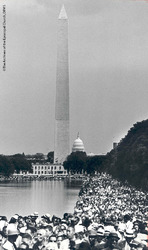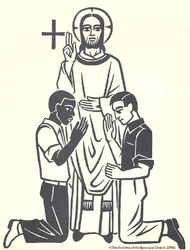Legacy
The Church Awakens: Civil Rights and the Search for Justice
The Montgomery Bus Boycott, the March on Washington, and Martin Luther King Jr.’s “I Have a Dream” speech are celebrated by Americans as signal episodes in the progress towards Civil Rights in American history. Less well known is the transformation of American civil society and the many institutions which responded to the African American call for a new public policy on race. Though divided and harboring racism, the Episcopal Church participated in the turbulent and impassioned events of this period. Individual Episcopalians, including lay persons, seminary students, clergy, and bishops, were moved to action by the inequality they witnessed in American society. The struggle to reverse social injustice would be played out in the Church and ultimately effect a change in Church policy and practices.
A cornerstone in the modern Civil Rights movement in the Episcopal Church was an organization of ordained and lay Episcopalians who committed themselves to removing all vestiges of segregation from the life of the Church. The Episcopal Society for Cultural and Racial Unity (ESCRU) adopted many of the tactics used by other civil rights protesters, such as peaceful protest and civil disobedience, to publicize long-standing problems of segregation and racial division in the Church.
Their legacy was a new coalition centered in activism for social justice on the one hand and a renewal of the catholic tradition and the universal Church of all baptized Christians on the other. As the Civil Rights movement turned to the campaign against racism and black empowerment, ESCRU faded and along with it the ideal of change through unity. This ideal lives on, however, and continues to be an organizing cultural ethic of the Anglican tradition. [Sources]



